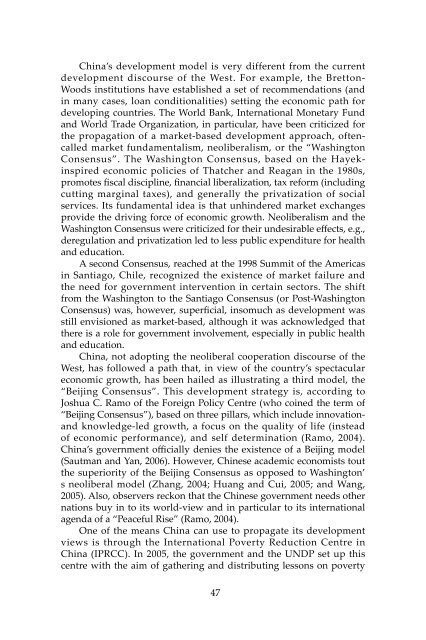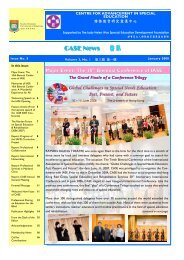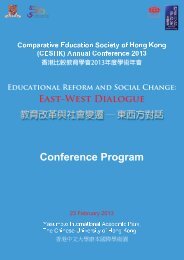Comparative Education Bulletin - Faculty of Education - The ...
Comparative Education Bulletin - Faculty of Education - The ...
Comparative Education Bulletin - Faculty of Education - The ...
You also want an ePaper? Increase the reach of your titles
YUMPU automatically turns print PDFs into web optimized ePapers that Google loves.
China’s development model is very different from the current<br />
development discourse <strong>of</strong> the West. For example, the Bretton-<br />
Woods institutions have established a set <strong>of</strong> recommendations (and<br />
in many cases, loan conditionalities) setting the economic path for<br />
developing countries. <strong>The</strong> World Bank, International Monetary Fund<br />
and World Trade Organization, in particular, have been criticized for<br />
the propagation <strong>of</strong> a market-based development approach, <strong>of</strong>tencalled<br />
market fundamentalism, neoliberalism, or the “Washington<br />
Consensus”. <strong>The</strong> Washington Consensus, based on the Hayekinspired<br />
economic policies <strong>of</strong> Thatcher and Reagan in the 1980s,<br />
promotes fiscal discipline, financial liberalization, tax reform (including<br />
cutting marginal taxes), and generally the privatization <strong>of</strong> social<br />
services. Its fundamental idea is that unhindered market exchanges<br />
provide the driving force <strong>of</strong> economic growth. Neoliberalism and the<br />
Washington Consensus were criticized for their undesirable effects, e.g.,<br />
deregulation and privatization led to less public expenditure for health<br />
and education.<br />
A second Consensus, reached at the 1998 Summit <strong>of</strong> the Americas<br />
in Santiago, Chile, recognized the existence <strong>of</strong> market failure and<br />
the need for government intervention in certain sectors. <strong>The</strong> shift<br />
from the Washington to the Santiago Consensus (or Post-Washington<br />
Consensus) was, however, superficial, insomuch as development was<br />
still envisioned as market-based, although it was acknowledged that<br />
there is a role for government involvement, especially in public health<br />
and education.<br />
China, not adopting the neoliberal cooperation discourse <strong>of</strong> the<br />
West, has followed a path that, in view <strong>of</strong> the country’s spectacular<br />
economic growth, has been hailed as illustrating a third model, the<br />
“Beijing Consensus”. This development strategy is, according to<br />
Joshua C. Ramo <strong>of</strong> the Foreign Policy Centre (who coined the term <strong>of</strong><br />
“Beijing Consensus”), based on three pillars, which include innovationand<br />
knowledge-led growth, a focus on the quality <strong>of</strong> life (instead<br />
<strong>of</strong> economic performance), and self determination (Ramo, 2004).<br />
China’s government <strong>of</strong>ficially denies the existence <strong>of</strong> a Beijing model<br />
(Sautman and Yan, 2006). However, Chinese academic economists tout<br />
the superiority <strong>of</strong> the Beijing Consensus as opposed to Washington’<br />
s neoliberal model (Zhang, 2004; Huang and Cui, 2005; and Wang,<br />
2005). Also, observers reckon that the Chinese government needs other<br />
nations buy in to its world-view and in particular to its international<br />
agenda <strong>of</strong> a “Peaceful Rise” (Ramo, 2004).<br />
One <strong>of</strong> the means China can use to propagate its development<br />
views is through the International Poverty Reduction Centre in<br />
China (IPRCC). In 2005, the government and the UNDP set up this<br />
centre with the aim <strong>of</strong> gathering and distributing lessons on poverty<br />
47
















